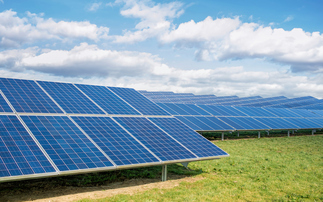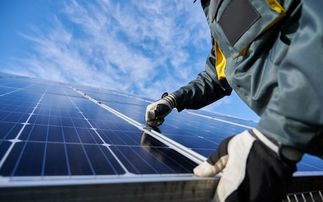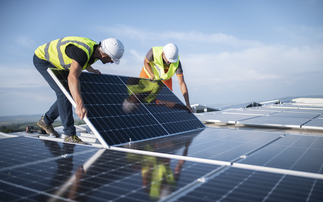Greg Barker says inappropriately sited projects could destroy good reputation currently enjoyed by sector
Poorly sited "monster solar farms" run the risk of ruining the good reputation enjoyed by the rest of the industry, the Climate Change Minister has warned, in comments that are likely to fuel fears of a government crackdown on larger developments.
Speaking exclusively to BusinessGreen, Greg Barker said he wanted to see solar farms developed on old industrial sites, former air fields or shielded from view by hedges, warning that highly visible arrays were "very bad news" for the industry.
Barker wrote to council chief executives last month highlighting the importance of solar for meeting the UK's renewable energy targets, but also pledged to "crack down" on inappropriate developments in the countryside.
The letter sparked fresh concern among some developers that the government is seeking to rein in large solar farm developments, after Communities Secretary Eric Pickles stepped in to block a solar farm from being built by Lark Energy at Ellough Airfield in Suffolk in October.
The industry maintains it is making an effort to deliver solar farms in line with best practice guidelines, including measures to support biodiversity and enable dual-use with agriculture. But it also fears Pickles' fresh focus on renewable energy planning rules is driven by politics rather any new evidence that solar projects are damaging to local environments.
Barker has yet to see the details of Lark Energy's Ellough Airfield case, but he insisted he was keen for more solar projects to be developed on brownfield sites.
He highlighted Lark Energy's existing scheme at Wymeswold Airfield, near Loughborough, and Lightsource Renewable Energy's project on a disused tin mine in Cornwall, as "very good examples" of well-located solar farms.
Barker also agreed with some of his Conservative Party colleagues that solar farms could in many instances prove a blot on the landscape, and argued he wanted to see an increased focus from the industry on the development of mid-sized commercial rooftop arrays, which are less visible.
"I'm not a fan of large-scale solar farms," he said. "That's not to say there are no cases where we can't have a large-scale solar farm, on disused airports or where they are shielded from public view. But the industry has to get very real and realise that there is a real danger that inappropriately sited monster solar farms could end up turning the tide of public opinion against solar, which would be an absolute disaster.
"That's why I'm so keen to drive forward the mid-sized market. That's where I see the opportunities. My team of officials are working very hard to work on these barriers to deployment."
Barker warned the solar industry that large solar farms could undermine the good name it currently enjoys.
"I do not want to see and I will not stand by and see large solar farms being built on landscapes that is going to upset communities and that turns the tide against solar," he said. "We're very lucky, there's very high support for solar and I want to keep it that way. We have to be very sensitive to landscapes and communities and to the countryside and just making sure it's appropriate."
Barker and Pickles' recently released guidance on planning appears to be already having an impact on local decisions. Councillors in Chorley, Lancashire last week unanimously rejected an 8MW solar farm on agricultural green belt land, with officials citing the new guidance in their recommendation.
However, the Science Museum secured approval last week to install a 40MW solar array at the site of its big-object store in Wroughton. The panels will be installed on a former RAF airfield, where the museum stores many of its artifacts that are not on display.
But Leonie Greene, of the Solar Trade Association (STA) urged the government to acknowledge that solar farms are increasingly been used to preserve the environment.
"The responsible industry understands that solar farms must be done well. Where they are done well solar farms enjoy strong public support - over 70 per cent according to our recent YouGov survey," she said.
"We'd like to hear ministers talk about the potential for good quality solar farms to help safeguard the British countryside. If we pursue a best practice agenda in the UK, solar farms can help farmers struggling on low incomes and they can be a vital tool for conservation."
She added that solar panels take up less than five per cent of land on solar farms, meaning the vast majority is available for other uses, such as protecting biodiversity.
"At the STA we are taking real care to work with leading farming and conservation groups to establish best practice right from the start of this industry - we'd like clear Government backing for that."









